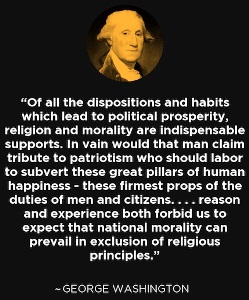
A survey by Statista reveals that in Belgium 68 percent of the people believe that religion does more harm than good: Germany, Spain, Australia, Sweden, and Great Britain all top 60 percent. No nation disagrees with this conclusion more than Japan; only 26 percent agree that religion does more harm than good. The world average is 49 percent; the figure for the U.S. is 39 percent.
A poll by the Pew Research Center found that a record share of Americans now think it is not necessary to believe in God to be moral. Fully 56 percent agree with this conviction, while 42 percent do not.
Regarding the first survey, we know from many studies that there is a positive correlation between religion and well being. For example, the more religious a person is, the healthier and happier that person tends to be.
Comparing people of faith to secularists, we find that the former have lower rates of depression, suicide, juvenile delinquency, crime, STDs, and the like. Moreover, no segment of the population is more likely to have higher rates of these dysfunctional conditions than those born out-of-wedlock.
Belgians may think that religion does more harm than good, but their social house leaves much to be desired. Out of 42 nations studied by the Organisation for Economic Co-operation and Development (OCED), Belgium had the 11th highest rate of out-of-wedlock births in 2014; in 1964 it had one of the lowest rates. Japan, by contrast, ranked 41st.
What is fascinating about the Belgian-Japanese comparison is that the Japanese are not a particularly religious people: most do not identify with a religion. But unlike Belgium, there is little anti-religious fervor in Japan. The Japanese may not practice religion, but they recognize its positive personal and social attributes.
The secular animus against religion, as played out in Belgium, is made manifest in two ways: (a) more Belgians, per capita, have fled to join Islamic terrorists in the Middle East than any other European nation, and (b) it has one of the highest rates of assisted suicide in the world (those with autism and mental illness are routinely killed).
Both of these stunning developments are a direct consequence of shunning Christianity, the religion that was most prevalent in Belgium before it lost its roots. Not a pretty picture.
Regarding the second survey, it is one thing to say that a secular person can be moral, quite another to say that society is best served by secularism. We've all met moral agnostics and immoral people of faith. That is hardly exceptional. What matters most, however, is whether society is best anchored in religious beliefs or secular ones.
In Western civilization, the Judeo-Christian ethos has been indispensable to personal and social well being. The fact that the West now has high rates of personal and social problems is not a coincidence: secularism has been on the rise.
Severing the tie between Christianity and morality is a fool's errand. It is not only impossible, attempts to do so yield ugly fruit. In the West, at least, we are best served when there is a religious-friendly environment, for when that takes hold, the chances of achieving a sound moral order are enhanced.
Polls aside, the empirical evidence shows that our Judeo-Christian heritage has done immeasurable good. George Washington said that "Religion and morality are the essential pillars of civil society." Nothing has changed since he spoke those words of wisdom.




 Sign Up to Receive Press Releases:
Sign Up to Receive Press Releases: